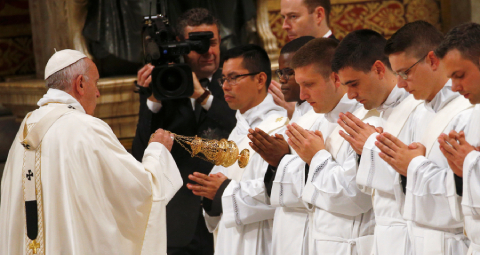January 24 | ![]() 0 COMMENTS
0 COMMENTS ![]() print
print

Celibacy: a precious gift for the life of the Church
Celibacy might be controversial, but it is at the core of the priesthood as imitators of Christ, writes Fr Michael Kane.
The theme of priestly celibacy has once again made news headlines around the world these past weeks. In particular, the recent interventions by Pope Benedict Emeritus, which appeared in Cardinal Sarah’s new book From the Depths of Our Hearts, have brought the issue back to the fore.
In the book, the Pope Emeritus and cardinal give a deeply personal rallying call to preserve this ancient discipline as a treasured gift for the life of the Church. Their compelling and heartfelt reflections are borne out of their lived experience of a lifetime of priestly service.
They speak as though protecting a precious jewel which is in danger of being stolen away by a contemporary mindset. They write out of a sense of duty, to protect something of inestimable worth. Pope Francis has also echoed these sentiments and has often spoken of his esteem for the gift of priestly celibacy.
Reflections
For us priests, we can only ever offer reflections on our own lived experience as celibates. I offer my own humble footnote to this debate which surely will continue to rumble on. Indeed this debate may become even more relevant as numbers of priests decline in the western Church, and married priests are inevitably proposed as a short-term solution.
In my own experience, I have found that many lay people adopt strong opinions based on a perception that priests live under the oppression of celibacy; that we are frustrated by a state imposed upon us by the Church. It seems noble to challenge such a situation; surely anyone would wish to ‘save’ anyone forced to live without freedom.
Yet celibacy is not forced upon any man. Those of us called to priestly service freely accept this promise for the sake of the Kingdom of God. We know it is part of the priestly calling and we offer it as a free and personal gift. This is key in understanding the fruits of celibacy.
Giving of the self
Priesthood is a total giving of self, in imitation of Christ who gave His life for the salvation of the world.
I wholeheartedly believe that it is a grace which comes from God to live in this way. Our celibate life is therefore always a human co-operation with divine grace on a daily basis.
Relying on this grace, priesthood forsakes marriage and natural fatherhood because it is orientated to a different type of paternity—one which is creative and loving and intimate, but in a different way. In this sense, ordination does not strip us of our paternal life but makes us fathers of a different kind.
Natural fatherhood gives way to spiritual paternity and priests should feel fatherhood as part of our identity. Our unique way of living opens up for us unique possibilities to share in the lives of so many, to serve freely and to do it without restraint. The gift of celibacy creates precious familial relationships of a different kind which enrich our lives.
Sacrifice
This is not to overlook an essential component of priestly celibacy which is sacrificial in nature. This, too, is key in understanding this way of life. It would be untrue to say that celibacy is always easy, or always appreciated as a gift and grace from God. A celibate will have difficult days in the same way a committed married man or a single man does.
Yet the experience of personal sacrifice, even personal loss at times, is precisely what gives celibacy its unique quality.
If priests are called to live in imitation of Christ, then that must extend to imitating His sacrificial life as closely as possible. This is seen most clearly as the Lord hangs on the Cross, but it also includes the daily sacrifice of living for others and not for himself.
The Gospels testify that His life was generously poured out for his brothers and sisters in their need and in their brokenness. His life was a daily, continual and repeated living sacrifice, a total and uncompromising gift, even to the extent of brutal bloodshed.
Alter Christus
If priests are to be configured to Jesus as an alter Christus (another Christ) then we should be very careful about emptying our lives of its sacrificial character. A more comfortable priesthood is likely to produce a less Christ-like priesthood. If anything, our difficult days as celibates prove our faithful imitation of Christ.
Of course, celibacy remains only a traditional discipline of the Church. It is not part of the unchanging deposit of Faith, like the maleness of the priesthood, for example, which successive popes have declared definitively. Celibacy could, of course, be removed at the instructions of the Holy Father. Yet, my own personal view is that such a change would damage priesthood and the close relationship we share with those we serve.
Of course, such a change would also create immediate and far-reaching practical implications. Married priests with children could not give the same urgency to pastoral duties, given the priorities of family life. Living a ‘dual vocation’ would surely ‘professionalise’ our vocation, with limits placed on our working hours.
Parish relations
Parishioners, for example, might be less likely to call us at 2am for a sick call, and would perhaps be less open in sharing their deepest thoughts with a priest who lives an intimate life with another. Trust would inevitably be tested. We would no longer be their priest, since we would belong to another.
There are also the other obvious implications such as financing married priests and their families. Nor could we be moved to the opposite end of the diocese at whim by a bishop: it would surely be unfair to uproot a settled family.
As a result, married priests could only promise partial obedience to the Church, in recognition of our other responsibilities. The reality is that a married priesthood would in no way resemble a celibate priesthood. Above all, I believe it would damage our imitation of Christ who was the servant of all.
Vocation
Celibacy should never, of course, be an oppressive weight in a priest’s life. If a seminarian cannot live celibacy joyfully and in a healthy, integrated way, then God is surely inviting him to find his joy in another place and in another vocation. That discernment is part of his self-discovery since celibacy is not a grace given to everyone.
Yet, every life involves its moments of struggle. This is a universal human experience. In those days when my celibacy feels more like a burden rather than a gift, it is because I belong to others: my life is not my own. In a strange way, it is in those moments when we most imitate the Lord Jesus. With arms open wide to others we say from the depths of our hearts: “This is my body, this is my blood, which is given up for you”.










